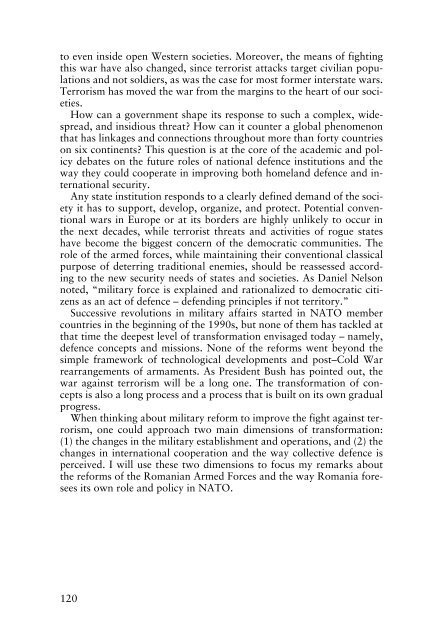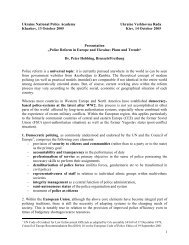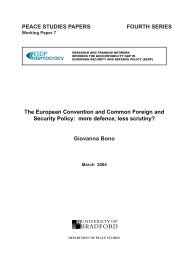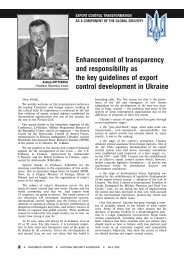combating terrorism and its implications for the security sector - DCAF
combating terrorism and its implications for the security sector - DCAF
combating terrorism and its implications for the security sector - DCAF
Create successful ePaper yourself
Turn your PDF publications into a flip-book with our unique Google optimized e-Paper software.
to even inside open Western societies. Moreover, <strong>the</strong> means of fighting<br />
this war have also changed, since terrorist attacks target civilian populations<br />
<strong>and</strong> not soldiers, as was <strong>the</strong> case <strong>for</strong> most <strong>for</strong>mer interstate wars.<br />
Terrorism has moved <strong>the</strong> war from <strong>the</strong> margins to <strong>the</strong> heart of our societies.<br />
How can a government shape <strong>its</strong> response to such a complex, widespread,<br />
<strong>and</strong> insidious threat? How can it counter a global phenomenon<br />
that has linkages <strong>and</strong> connections throughout more than <strong>for</strong>ty countries<br />
on six continents? This question is at <strong>the</strong> core of <strong>the</strong> academic <strong>and</strong> policy<br />
debates on <strong>the</strong> future roles of national defence institutions <strong>and</strong> <strong>the</strong><br />
way <strong>the</strong>y could cooperate in improving both homel<strong>and</strong> defence <strong>and</strong> international<br />
<strong>security</strong>.<br />
Any state institution responds to a clearly defined dem<strong>and</strong> of <strong>the</strong> society<br />
it has to support, develop, organize, <strong>and</strong> protect. Potential conventional<br />
wars in Europe or at <strong>its</strong> borders are highly unlikely to occur in<br />
<strong>the</strong> next decades, while terrorist threats <strong>and</strong> activities of rogue states<br />
have become <strong>the</strong> biggest concern of <strong>the</strong> democratic communities. The<br />
role of <strong>the</strong> armed <strong>for</strong>ces, while maintaining <strong>the</strong>ir conventional classical<br />
purpose of deterring traditional enemies, should be reassessed according<br />
to <strong>the</strong> new <strong>security</strong> needs of states <strong>and</strong> societies. As Daniel Nelson<br />
noted, “military <strong>for</strong>ce is explained <strong>and</strong> rationalized to democratic citizens<br />
as an act of defence – defending principles if not territory.”<br />
Successive revolutions in military affairs started in NATO member<br />
countries in <strong>the</strong> beginning of <strong>the</strong> 1990s, but none of <strong>the</strong>m has tackled at<br />
that time <strong>the</strong> deepest level of trans<strong>for</strong>mation envisaged today – namely,<br />
defence concepts <strong>and</strong> missions. None of <strong>the</strong> re<strong>for</strong>ms went beyond <strong>the</strong><br />
simple framework of technological developments <strong>and</strong> post–Cold War<br />
rearrangements of armaments. As President Bush has pointed out, <strong>the</strong><br />
war against <strong>terrorism</strong> will be a long one. The trans<strong>for</strong>mation of concepts<br />
is also a long process <strong>and</strong> a process that is built on <strong>its</strong> own gradual<br />
progress.<br />
When thinking about military re<strong>for</strong>m to improve <strong>the</strong> fight against <strong>terrorism</strong>,<br />
one could approach two main dimensions of trans<strong>for</strong>mation:<br />
(1) <strong>the</strong> changes in <strong>the</strong> military establishment <strong>and</strong> operations, <strong>and</strong> (2) <strong>the</strong><br />
changes in international cooperation <strong>and</strong> <strong>the</strong> way collective defence is<br />
perceived. I will use <strong>the</strong>se two dimensions to focus my remarks about<br />
<strong>the</strong> re<strong>for</strong>ms of <strong>the</strong> Romanian Armed Forces <strong>and</strong> <strong>the</strong> way Romania <strong>for</strong>esees<br />
<strong>its</strong> own role <strong>and</strong> policy in NATO.<br />
120

















